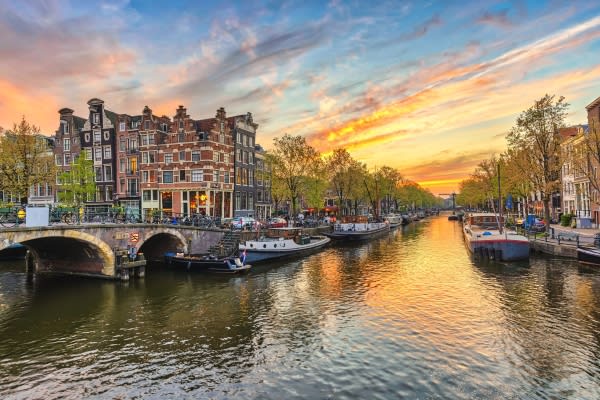The Netherlands
Overview and productions
In the Netherlands, recent research has revealed the Film Production Incentive generated $1.1bn (€1.04bn) in production expenditure in the Dutch film industry between July 2014, when it was introduced, and December 2024.
The Netherlands’ compact scale belies a vast diversity of architecture, landscapes and period authenticity — from the canals of Amsterdam to the vast industrial ports of Rotterdam, waterworks, dune coasts and medieval towns. International producers are drawn here not only for visual versatility, but also for the robust infrastructure, highly skilled English-speaking crews and incentive programme.
It is some time since the Netherlands has attracted projects on the scale of Christopher Nolan’s Dunkirk, but plenty of smaller dramas and series are still shooting in the territory. International productions supported by Netherlands Film Fund include Mouly Surya’s 1940s-set Indonesian epic This City Is A Battlefield, which closed International Film Festival Rotterdam 2025 and was co-produced by Rotterdam-based Volya Films, and Sophie Hyde’s Jimpa, a semi-autobiographical drama that shot partly in Amsterdam and premiered at Sundance 2025. Ukraine’s Sergei Loznitsa has made his recent dramas and documentaries with Dutch support.
The past year has seen the Netherlands lean further into strategic co-production opportunities — most notably with the UK via a memorandum of understanding signed with the British Film Commission, and a recently activated co-production treaty with Indonesia. These moves are bearing fruit: the Netherlands has seen increased interest from Southeast Asia and the UK.
“Our incentive programme, with a cap of €3m [$3.2m], is particularly well suited to ambitious mid-budget productions in the €10m-€20m [$10.7m-$21.4m] range,” says Netherlands film commissioner Roeland Oude Nijhuis. “While our scheme is not ideal for large-scale blockbuster shoots, we are always open and supportive when those opportunities arise. Ultimately, our focus is on enabling creative, high-quality international collaborations of any size.”
Plenty of Dutch production outfits are experienced in co-productions and used to working with international partners, among them Topkapi Films, Lemming Film, KeyFilm, Circe Films, N279 Entertainment, The Film Kitchen and Kappa Holland Studios.
Luxembourg remains an active co-producer. It may not have an incentive or rebate system but Film Fund Luxembourg, which offers selective support, has backed international drama and animation. Recent projects include films from Radu Jude, Margarethe von Trotta and Wang Bing. The fund also invested a reported $3.2m (€3m) in Caroline Origer’s family animation Tally Ho! (aka Spiked!), about an orphan hedgehog who becomes sidekick to a rabbit with memory loss.
Drama series Droneland shot in the Hague, Luxembourg and Germany with Luxembourg outfit Iris Productions as lead producer and the Netherlands’ Topkapi, Poland’s Enter Film and Iris’s German offshoot as co-producers.
First person to contact: Roeland Oude Nijhuis, Netherlands film commissioner: info@filmcommission.nl

Gallery
Local partners
Belgian producers work especially closely with their Dutch partners. Co-productions between the two nations can make use of both the Dutch incentive and the Belgian tax shelter. There are also reciprocal arrangements in place between the Flanders Audiovisual Fund (VAF) and its Dutch equivalent, the Netherlands Film Fund. Crew members tend to work in both countries and often distributors will pick up rights for all of Benelux.
If Belgian producers are their natural partners, Dutch producers are also working with Scandinavian countries, for example, on Danish director Thomas Vinterberg’s The Alcohol Project, and with UK partners, including Vertigo’s London-set police series Bulletproof.
Locations and permits
The Netherlands has always drawn in productions to its unique locations like the Amsterdam canals, and of course we see a windmill every now and then.
The film business is concentrated around the picturesque city of Amsterdam, which can get crowded, but Rotterdam, The Hague and other cities offer a variety of shooting options, and impressively, places like Dordrecht and Delft are even being used as doubles for Amsterdam.
The most popular shooting locations tend to be the canals, coastal landscapes (dunes and beaches) and farming fields and meadows. Rotterdam is also attracting interest with its architecture of modern skylines combined with large, industrial ports. For location back-up or additional sets there are also studios close by available within the cities' borders.
One of the huge draws for international filmmakers is the beautiful Dutch light, a quality mentioned frequently by cinematographers.

Crew and infrastructure

Travel
The country’s main airport, Amsterdam’s Schiphol, has flights to almost every international destination. The country also boasts excellent road and rail infrastructure.

Sign up for newsletter
Newsletter